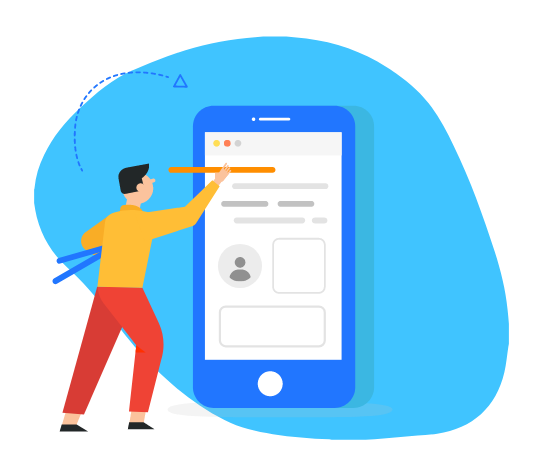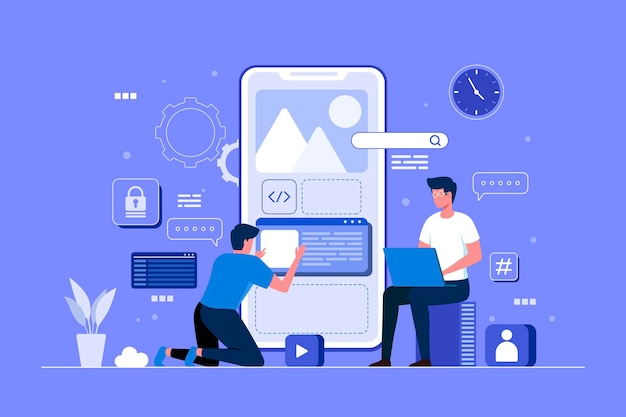IOS & Android Development
Mobile App Development Company
Our highly skilled mobile app developers ensure high accomplishing and feature-packed Android, iOS, and hybrid mobile applications. InvoZone has a pool of iOS app developers to cover all your iOS app development requirements. The skilled iOS app development team delivers, secures, and builds reliable apps for all Apple products. We use Objective-C and Swift programming languages to build and maintain mobile app outlines for the best user experience on the iOS platform. Get a team of android app developers that covers the whole Android app development range and can help to build apps for Android smartphones, tablets, Android TV, and Android Wear OS

We have the needed expertise in JAVA and Kotlin, with our backend team employing python to develop APIs for manufacturing awesome custom Android apps. Employ react-native developers to actively build quality hybrid mobile apps and APIs that flawlessly participate with third-party mobile applications. Our team uses React-Native, Xamarian, and Ionic to build interactive cross-platform mobile applications. We are a company/firm that offers their clients a whole host of services relating to their IT needs. Our zone of expertise/professionalism covers many fields that branch off from such simplistic needs. earch Engine Optimization Web Designing IOS & Android Development & Development E-commerce Development IOS & App Development UI/UX Design FAQs Terms & Conditions Blogs Contact All Rights Reserved We are glad that you preferred to contact us. Please fill out our brief form and one of our responsive team members will contact you back. Select Service Design & Development Digital Marketing Agency IT Consultancy Tech Solutions

Major Differences Between iOS and Android App Development
Differences in Development
The biggest dissimilarities between Android development vs iOS development are the technical ones. Platforms have different programming languages, testing approaches, and so on. The most common differences in IOS & Android Development on the technical side go as follows:
Programming languages
iOS vs Android programming use different technology stacks. The first one has the Swift proprietary language designed for app development while the second one heavily relies on Java or Kotlin as an alternative. Which stack is faster and easier to master? Most mobile app developers find an iOS app is easier to create than the Android one. Coding in Swift requires less time than getting around Java since this language has high readability.
In the future, however, as Kotlin develops further, the tables may turn once again. The language is considered a soon-to-be Java replacement – it’s intuitive, modern, and easy to read.
Development environment
Another major difference between  iOS and Android development lies in the integrated environment.
Android developers utilize Android Studio, a proprietary tool introduced by Google in 2013 and sporting an expanded range of available features. This integrated development environment has cross-platform support, high readability, a wide range of development and debugging features.
iOS developers, on the other hand, rely on the proprietary XCode tool. The Apple-backed solution provides a variety of bug fixing tools, supports the entire range of iOS devices, and is easy to get around.
Development complexity
When it comes to iOS vs Android app development complexity, Android loses by big numbers. It has a lot to do with device fragmentation. While Apple releases a limited range of devices and thus has a small range of screen dimensions to account for, it’s not the case with Android. There are dozens of screen styles based on the screen size, density, and the version of the OS.
Apart from having to adjust the graphics to the whole range of devices, a developer will have to use dozens of device simulators during testing to ensure the app is displayed equally for all users. As a result, both testing and IOS & Android Development require countless reviews and iterations, are resource- and time-consuming.
Device fragmentation
We have already covered the implications of Android device fragmentation when it comes to testing and development. As a result, designers have to withhold from creating detailed application interfaces as they will be extremely slow on low-end Android devices. The difference in screen dimensions makes setting proportions and layout elements optimization more challenging and time-consuming as well.
Device fragmentation makes designing for Android a pain in the neck. That’s why the interface of an Android app will cost more and take a longer while to make compared to iOS designs.Â
